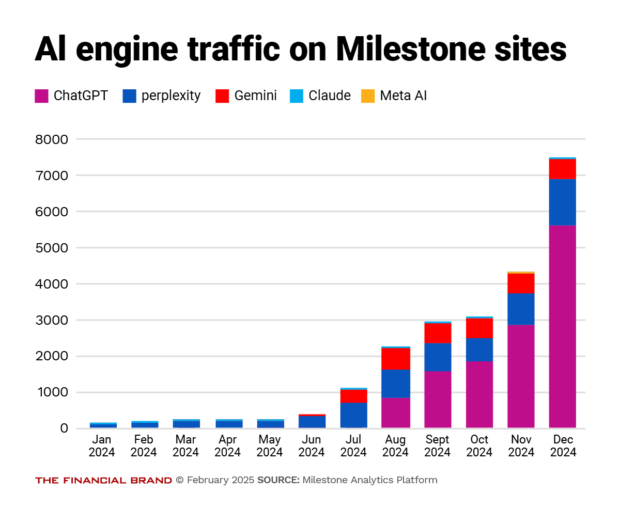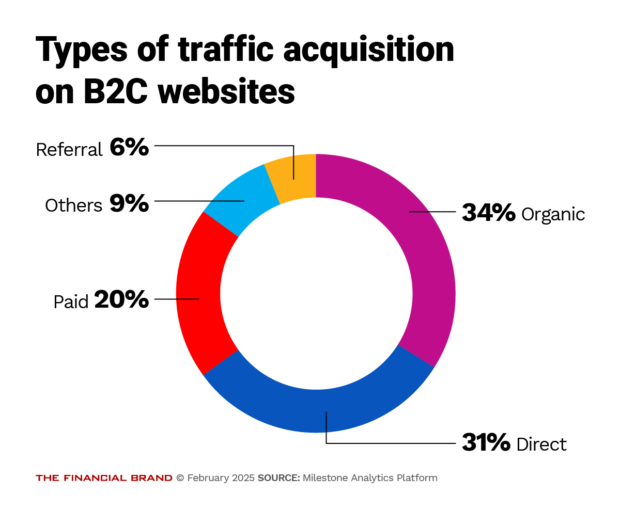Search is expanding beyond Google. Brands need to prepare their websites and content distribution strategies to get their content indexed by these alternative engines. This marks the biggest disruption since Google began dominating search in the early 2000s. It also presents brands with a new opportunity to enhance their content visibility.
For the first time in over 20 years, consumers have a new way to access information on the internet. This disruption, initially catalyzed by ChatGPT 15 months ago, is now the fastest-growing area within AI. With the proliferation of many more large language models (LLMs), consumers will increasingly obtain information from sources other than Google. This shift offers a unique opportunity for brands. Data from our analytics platform shows an exponential increase in traffic from AI-driven LLMs over the last few months—a trend we expect to persist in the foreseeable future.
What This Means for Financial Brands
Consumers will no longer rely solely on Google to find information online. Currently, an average brand derives 34% of its traffic from organic search.
Chief marketing officers (CMOs) now face the challenge of preserving this traffic, as the sources of the traffic diversify. This article aims to address how brands can maintain and grow their visibility in this changing landscape.
Common Challenges in AI Content Indexing for Financial Institutions
While AI-driven search presents new opportunities, financial institutions must address several key challenges:
1. AI Search Models Are Still Evolving
Unlike traditional search engines, AI models rely on probabilistic data retrieval rather than direct indexing. This means financial institutions must constantly refine their content strategies as AI search technology matures.
2. Increased Competition for AI Visibility
As more brands optimize for AI-driven search, financial institutions must differentiate themselves by producing highly authoritative, original, and data-backed content that AI models prefer.
3. The Complexity of Compliance and Accuracy
Financial institutions operate in a regulated environment where content must be precise and legally compliant. AI engines may misinterpret or oversimplify financial information, making it crucial for institutions to structure their content with schema and explicit disclaimers to ensure accuracy.
How to Get Your Content in AI Engines
Most AI Engines use similar algorithms and strategies to index the web content. A common constraint all these engines have is that their indexing and crawling need to be very efficient because of the cost associated with AI GPUs. We list below some of the factors that make it easy for the AI engines to index your content:
1. Website’s Technical Performance
Ensure your website is technically sound so crawlers can easily access and index your content. Key factors include site speed for both mobile and desktop, mobile site stability, and user-friendly navigation. Use XML sitemaps and robots.txt files to facilitate efficient crawling. AI engines currently do not render JavaScript effectively. This limitation makes server-side rendering (SSR) crucial for ensuring that your content is accessible to these bots. SSR also enhances user experience with faster load times and stable browsing.
2. Create Valuable Content
Produce content that is genuinely helpful to consumers. Google refers to this as “Helpful Content.” Each industry has unique types of content that add value. For financial services, examples include financial calculators to assist users in estimating mortgage payments or retirement savings, detailed guides and explainers on complex topics like mortgage options or retirement planning, and FAQ pages addressing common questions about financial products. Additionally, visual content such as infographics or interactive tools can simplify intricate concepts, making them more accessible and engaging for consumers. AI crawlers prioritize useful, high-quality content, so ensure your content is relevant, enhances the user experience, and aids decision-making.
3. Incorporate Structured Data (Schema Markup)
Structured data markup or Schema markup communicates exactly what content you have on your website thus reducing the effort to understand the context of your content. A more detailed markup (what we call Advanced Schema) helps the search engines understand the depth of the content. Ensure that your website has advanced schema markup. This is important for maintaining a low crawl budget for LLM crawlers and minimizing indexing costs.
4. Enhance Local Profiles
If you are a location-based business, optimize your local profiles on platforms like Google, Bing, Apple, Facebook, and Foursquare. For instance, Google and Gemini extract data from Google Business Profiles, while Bing uses Bing Maps. ChatGPT recently announced it will source data from Foursquare.
How Financial Institutions Can Future-Proof Their AI Visibility
By implementing these best practices, financial institutions can enhance their chances of securing prime visibility in AI search. A Digital Experience Platform that integrates AI-friendly technologies can simplify the process, ensuring seamless indexing and improved traffic from AI search engines.
Key capabilities of an AI-optimized platform include:
- Advanced schema markup for structured content organization.
- High-speed, technically optimized websites that facilitate efficient AI crawling.
- AI-powered content automation to streamline updates and ensure relevancy.
- AI-driven image and video optimization to improve discoverability in multimodal search environments.
- Comprehensive local search integration to boost visibility in location-based AI queries.
Websites built with these technologies are already seeing measurable growth in AI-driven traffic. For financial institutions looking to strengthen their digital presence in this new era, now is the time to act.
Final Thoughts
AI search is redefining the way consumers find financial information. Those who adapt their content strategies today will emerge as leaders in tomorrow’s AI-powered digital landscape. By focusing on technical performance, content value, structured data, and local optimization, financial institutions can secure long-term success in an AI-driven search ecosystem. Now is the time to adapt — financial institutions that optimize today will lead in AI-driven search tomorrow.
Source: THE FINANCIAL BRAND





Recent Comments